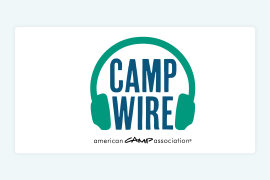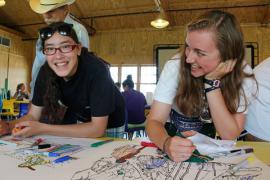Nellie was a conundrum. She didn’t smile very readily and preferred hanging out at the edge of camper groups. She didn’t initiate conversation either; she generally waited until someone approached her. She rarely spoke to counselors and tended to do so when others weren’t around. She didn’t get excited over things like other campers. Indeed, it was challenging to get a read on what she was feeling because she seemed to disappear among the other kids.
Nellie was easy for us to overlook. She was simply an OK camper.
. . . Until one of her counselors lost it. A couple campers had pulled their last stunt; they tried the counselor's patience once too often and the counselor ended up yelling — quite sternly — at them. While the targeted campers absorbed the tirade, it was Nellie’s reaction that grabbed our attention. She literally tucked herself into a corner of the cabin, knees tightly drawn to her chest, elbows tucked to her sides with hands alternately covering her ears and wiping the tears flowing from her eyes. She cowered. It took quite a bit of gentle one-on-one talking to bring her around. Then later, when one of her counselors checked in with her during a quiet moment, the story came out.
Nellie was from a home where parental yelling quickly gave way to hitting. She had learned not to do anything that might instigate this, not to ask questions nor request help, and to “disappear” among her siblings. The story went on.
This quiet camper had a traumatic background, one that squelched her natural curiosity in favor of seeking to exist without being noticed by others. If her counselor hadn’t taken time to check in with her, I wonder if we would have learned anything more about Nellie or what I now know as “trauma-informed care.”
Nellie has a lot of company. I eventually learned that 70 percent of the general population — that includes our campers and staff — have coped with at least one adverse childhood experience (ACE) by the time they reach age 18. These events include physical, emotional, and/or sexual abuse, feeling unloved or unwanted by one’s family, being afraid that basic needs like having food and shelter won’t be met, coping with separation or divorce of caregivers, and witnessing domestic violence or having someone in the home get incarcerated. In addition, one out of six people report four or more of these happening to them. That works out to a fair number of campers and staff! I came to learn that Center for Disease Control and Prevention (CDC) research revealed that experiencing four or more ACEs during one’s youth predisposes one to chronic illnesses like asthma and increases the likelihood of alcoholism or suicide.
Nellie taught me that ACEs were more prevalent than I ever expected, that campers and staff come to our programs with this history, and that a camp experience may — despite good intentions — trigger the negative behaviors and feelings associated with a person’s ACE background. My work as a camp professional needed to become more aware, so I did some self-study and pass these resources to you:
- If you don’t do anything else, at least view Dr. Allison Jackson’s short (less than 10 minutes) YouTube talk, “A Call to Connection: Making Childhood Trauma Personal." You’ll understand more about ACE experiences and how those of us who don’t have a zillion letters after our name can make a difference. Consider showing this during staff orientation and then processing Dr. Jackson’s message with this question: how does this information impact the way we do things at camp?
- Read Casey Gwinn’s book, Cheering for the Children (2015). Available from providers like Amazon, Gwinn focuses on “creating pathways to hope” rather than wallowing in dismalness. This may be a great pre-camp read for your leadership team.
- Print and post the PDF, "What Does It Mean to be a Trauma-Informed Camp," in your staff lounge. Reference its content when a camper is particularly challenging.
- Open www.bing.com, click into the site’s “images,” and put “trauma-informed infographics” into the search line. Several options appear. Review those from reputable sources to build your knowledge or provide information to others.
Nellie changed me. She gave me the tremendous gift of more deeply understanding what campers and staff bring to their camp experience and how we, as camp professionals, can adjust our way of doing things so we’re supportive to people with ACEs in their lives. I, in turn, am challenging you; become trauma-informed and shape your camp experiences to be both supportive and hopeful.
Take Nellie’s gift. Add it to your MESH repertoire. Then use the response area below to tell the rest of us how you adapted something at camp in a trauma-informed way. Let’s learn from one another just as I learned from Nellie.
Linda Ebner Erceg, RN, MS, PHN, is the program coordinator for Bemidji State University’s Certificate in Camp Nursing (MN). Her experience includes over 30 years as a year-round camp nurse for Concordia Language Villages and deep experience in working with camp professionals to address camp health needs. She currently chairs ACA’s Healthy Camps committee where her time at camp as well as her former role as executive director for the Association of Camp Nurses now contributes to her educational and research activities.




